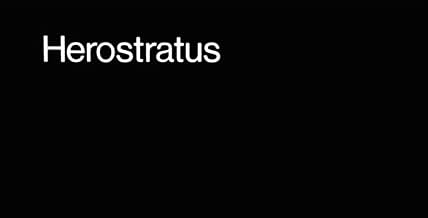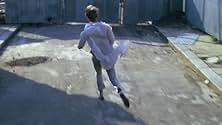Adicionar um enredo no seu idiomaWhen young poet Max (Michael Gothard) hires a marketing company to turn his suicide-by-jumping into a mass-media spectacle, he finds that his subversive intentions are quickly diluted into a... Ler tudoWhen young poet Max (Michael Gothard) hires a marketing company to turn his suicide-by-jumping into a mass-media spectacle, he finds that his subversive intentions are quickly diluted into a reactionary gesture, and his motivations are revealed as a desperate attempt to seek atte... Ler tudoWhen young poet Max (Michael Gothard) hires a marketing company to turn his suicide-by-jumping into a mass-media spectacle, he finds that his subversive intentions are quickly diluted into a reactionary gesture, and his motivations are revealed as a desperate attempt to seek attention through celebrity.
- Sandy
- (as Mona Chin)
- Radio Presenter
- (narração)
- Poet
- (narração)
- Patient on Bed
- (não creditado)
Avaliações em destaque
I have never been more moved by a film. I can compare it only to such transforming experiences as seeing L'Avventura in the early 'sixties, although the art of Herostratus is far more mysterious. The mystery is compounded by the great gulf of years that separates me from that screening, by the fact that almost nobody I meet has seen it or even heard of it, and by the apparent lack of any body of explication and commentary.
Without seeing it again I wouldn't attempt a precis of the plot, but what remains in memory is the cool classicism of the narrative(innocence vs. worldliness and levels of manipulativeness that Henry James might have appreciated) as mediated through an unobtrusive but arresting surrealism of technique.
It's been 35 years--I'd really like to revisit Herostratus.
A film by Don Levy (1967)
Herostratus is the first feature film by Don Levy whose short films have been distinguished by their original technique and penetrating approach to their subject.
Herostratus is in the same tradition. The story, on the surface, seems simple. A young man wants to commit suicide publicly and in the presence of as many people as possible. He persuades a public relations firm to exploit the event then he changes his mind but by this time other forces are active and he is no longer in control of the situation.
Levy exposes his characters and their motives layer by layer. He does so in the context of a society whose aims and aspirations are centered on private gain and personal success, virtually at any price; in this society the idealism and humanism which can unify a country after a war are rapidly displaced by destructive self-interest. It is not enough, in Levy's view, to say that war is hell. One must go deeper, find the causes, and attack them.
Herostratus, essentially a film d'auteur, is technically dazzling, but never in a gratuitous or bravura sense. Levy alternates "one-take" scenes (designed to gain the greatest response from the actors, who improvised their dialogue) with short scenes and "threshold" sequences making, in Levy's words, an intricate network of emotional references.
Herostratus takes its title from the legendary figure who burnt down the temple of Artemis in Ephesus, one of the Seven Wonders of the World, in a bid to gain immortality by some great feat of destruction in the manner of the conquerors. On the same night Alexander the Great was born.
From the brochure of the 2nd Annual Los Angeles FILMEX (1972), written by Richard Whitehall:
A British masterpiece of underground cinema seems almost a contradiction in terms, yet Don Levy, with his first feature, has broken through those literary traditions on which the British cinema has been so firmly founded. Under the greatest of difficulties (more than six years from conception to completion), and a minimal budget ($25,000) Levy has produced a dazzling film d'auteur quite unlike any other film ever made. Long takes, through which the actors improvise brilliantly, alternate with clusters of staccato, sometimes subliminal imagery as Levy explores the ramifications and resonances of his theme: the revolt of a young failed poet against the horrors and corruptions of society, and the means he takes to make his protest known.
This theme becomes a visual mosaic of emotional cross-references, combining an apparent linear form, in which sequences seem to follow a chronological order, with an abstract and metaphoric visual structure in which the magnificently composed and edited images are placed in emotional and intellectual juxtaposition and conflict. Levy, filmmaker, painter, scientist, and now on the faculty of California Institute of the Arts, has produced one of that handful of films which has changed the contemporary conceptions of narrative cinema.
Distribution problems may have kept Herostratus from general audiences, but its impact on filmmakers, especially in western Europe, has been profound. Its influence may be seen not only in the revitalized German cinema of "Junge Deutscher Film" but also in Kubrick's A Clockwork Orange.
Any way, I'm glad that the Mirren sequence drew me in... because this movie has a lot to offer and I've never seen anything quite like it. Immediately from the first couple of minutes, you know you're in for an obscure sensory ride. I don't think I've ever seen a feature film this long that maintains such "art-house" cutting throughout it's length. The film weaves very consistently through surrealist sequences, quick cuts of intense historical footage, and traditional dialogue-based scenes.
The movie has plenty of strong suits. It's photographed very tastefully. The UK setting is quite gorgeous to look at and immerse yourself in. Michael Gothard carries the film in a unique and thrilling way, through his impulsive and virile character. Co-star Gabriella Licudi is divine looking in all of her orange clothes and accessories, and she puts in an extremely strong performance. I didn't expect to feel any emotive response as I reached the end portion of the movie, but one sequence fronted by Licudi took me by surprised - and all of a sudden the tears hit me. I was totally won over by her presence and will definitely be exploring more of her catalogue soon. She sucked me in a similar way to my favorite Euro actresses of the 60's/70's tend to, such as Catherine Deneuve, Claudia Cardinale, or Isabelle Adjani.
It has far less faults than it does strengths. I would certainly trim a bit of fat off of the overall length if it were up to me - I think this would have sat perfect at about 1 hour and 50 minutes to 2 hours, rather than 2 and 20, but I can't complain much - this is a one-of-a-kind offering and it is what it is. The plot may require a slight suspension of disbelief in the beginning but once you open up to it's concepts, everything else that happens around it is very relatable and correlates with general human experience. The film requires patience but if you have that, and a love for the atypical, chances are you will find plenty to love about this bizarre movie.
I will end by saying that it does have a very bleak tone, overall. So as long as you can get down with that, I would recommend checking this movie out. It is about suicide, and power, after all. To learn that both the lead actor and the director later killed themselves in real life did not come as a huge surprise. <3
This British underground film was unseen for close to forty years before it was resurrected by the BFI. It is a very odd film indeed, pretty much fully an avant-garde piece. The story-line is essentially quite basic and not a huge amount of plot really happens, which for a 142min film is unusual. For me, by far the most interesting thing about this one was its visual ideas. It's a film which is relentlessly experimental in approach with elements of surrealism. The memorable visuals are often achieved by way of very bold editing techniques used throughout, where contrasting images are juxtaposed with each other. There is recurring imagery used extensively, including a mysterious black clad woman wandering the backstreets of London, an exotic dancer interspersed with images from a slaughterhouse, old newsreels and many billboard advertisements. There is a hell of a lot more than this as well but this is a film which throws a lot at you and it can be hard recalling precisely everything that occurs. There is a mixture between very long single takes and fast edits, the former are used for dramatic intensity. Michael Gothard is the lead here and he is an actor associated with intense performances, so he is a good fit it has to be said. The film overall is certainly a fascinating watch but it is slow in places and there are patches where it does get a bit tedious. The narrative was semi-interesting but the visual invention is really what it's worth seeing for and it is for sure a film that should be seen by those drawn towards experimental cinema. Look out too for an appearance of a very young Helen Mirren.
Combining satire and tragedy, and starring the brilliant Michael Gothard, this is a blazing account of how acts of genuine rebellion are ultimately destined to be commodified and sanitised and deserves to be appreciated by a wider audience looking for drama presented in an offbeat manner.
Você sabia?
- CuriosidadesHelen Mirren's debut.
- ConexõesEdited from Nazi Concentration Camps (1945)
Principais escolhas
- How long is Herostratus?Fornecido pela Alexa
Detalhes
- Tempo de duração2 horas 22 minutos
- Cor
- Mixagem de som
Contribua para esta página
























